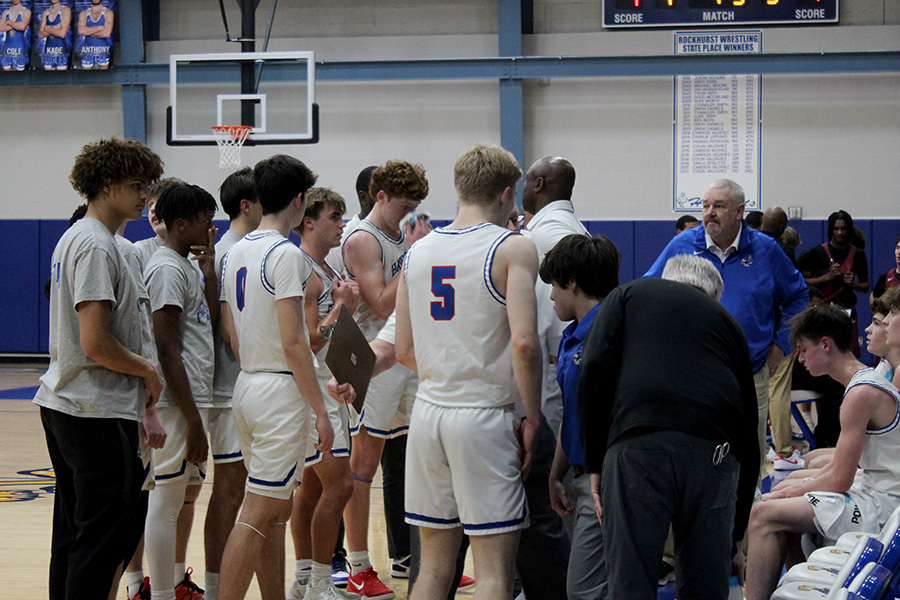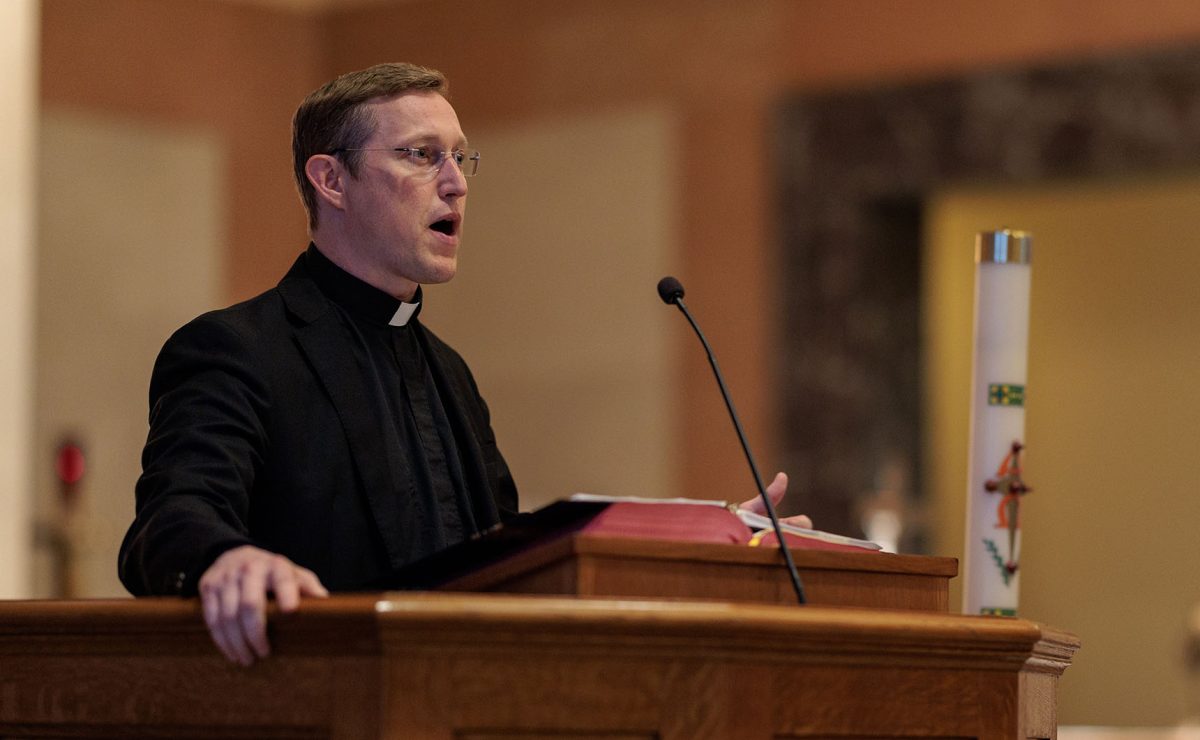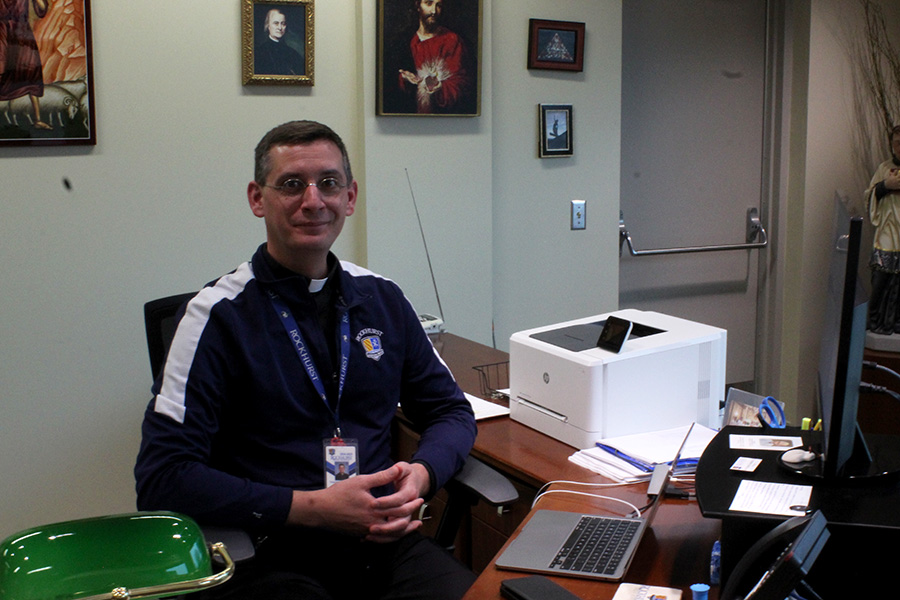“You’re Preparing Yourself For Torture”
One quarter in, students share thoughts on the Combined A/B Day schedule.
Activity Periods are fewer under the new schedule, bringing less time to meet with clubs, as well as finish up homework during the school day.
November 4, 2022
Every year at Rockhurst brings changes, but some years bring more than others, causing the student body to make adjustments to meet the new normal. For many, Rockhurst’s adaptation to COVID-19 comes to mind, with students required to change their everyday behaviors to fit a new situation. This year, however, students face a different reality: a new schedule that combines the familiar block days with another where students have every class in a single day.
While opposition to this new schedule was louder and more visible the first couple weeks of school, the Prep News has learned however, that one quarter in, student perception still seems decidedly opposed to the Combined A/B Day schedule, by about a nine to one margin, based on unscientific Prep News polling data.
“At first, I wasn’t quite sure what to think of [the new schedule],” said sophomore Connor Deady. “I thought it wasn’t necessarily bad, [but] as the year went on, my dislike for it definitely grew. There’s much less free time. Mondays are so much worse. This Monday I was up until past one o’clock in the morning doing homework, [because] I had so much [and] it was hard to manage.
“I don’t really think people like it at all. Everybody who I’ve talked to has said they’ve hated it.”
For many, the primary complaints are similar across the board: combined A/B Mondays bring more homework, less time, more tests on the same day, and much more stress. With all of a student’s classes laid out on the same day, students can potentially have homework for seven different classes due on Monday. At the same time, however, all seven Monday teachers might load up homework for Tuesday and Wednesday, making the first three days of the week (not just Monday) tolling, said many students.
Even testing changes under the new schedule. Monday tests might take the place of (or even supplement) homework to do over the weekend, with 45-minute Monday class periods full of assessments rather than regular classwork.
For one student, junior Jude Sojka, high expectations about the new combined schedule soon turned into hard opposition.
“Now that I’ve experienced it and I know what’s coming every so often, it’s like you’re preparing yourself for torture almost…every single Monday. I pride myself as [a person] fairly well at time management, but I get seven different teachers loading up homework over the weekend because they know that [I’ve] got that extra time. It’s really taking a toll on everybody around here.”
While Mondays are grueling for most students, for some, they help make weeks more consistent. With the all-block schedule last year, some students might not attend a class for a week or more, due to a week’s particular schedule or student absences. The new combined schedule, for all its criticism, does result in students seeing teachers more regularly.
“You can really plan ahead,” said sophomore Jack Manning. “I like having B days always on the same day. I kind of prefer knowing what I’m gonna get every week.”
However, at the same time, while consistency for some might be a high point of the new combined schedule, for others, the same consistency led to what were likely unintended consequences. With every Friday a B day, students consistently miss the same classes if they leave school for a family trip or a school activity. For those with a lighter schedule on B days, there might even be a temptation to skip school on Friday, especially if one’s B day schedule is elective heavy. At the same time, with a maximum of two B days a week now, Activity Periods have gone down, leading to less time for clubs and other activities.
“You miss the same classes [every] Friday, with say, debate tournaments,” said senior Thomas Kennedy, summarizing his views on the new combined schedule as, “Less clubs, more homework, less free time during the day and you’re missing the same classes at the end of the week.”
At the same time, however, Rockhurst has had the new combined schedule for almost three months now. As students progress through the year, one might argue that, over time, the combined schedule would be easier to manage–or at least less stressful. For some, three months has led to adjustment, but not necessarily a positive one.
“I think [the schedule] is very hard, but I’ve adjusted to it,” said sophomore Michael Redlich. “[However], I don’t think that’s a good thing because I don’t think adjusting to stress is something that’s very beneficial.”
This stress brought on by the combined schedule’s increased homework load has likely affected those involved outside the classroom most. For students who participate in sports right after school, practice means athletes might not return home until six–or even later. If potentially seven teachers assign homework on Monday that’s due on Tuesday or Wednesday, the first half of the week can be brutal for not only Rockhurst’s student-athletes (roughly more than half of the school’s students), but for any student participating in after-school activities.
For sophomore Connor Deady, the combined schedule makes his involvement in multiple extracurriculars much more difficult.
“Personally, I’m in a lot of different activities–debate, cross country [and] robotics this year. The extra homework load on Mondays, especially coming off a race on Saturday, was not pleasant. It continues to give me way too much work, more than I can handle.”
For months, students have circulated petitions to remove the combined schedule (one received hundreds of signatures) as well as voiced their concerns to Rockhurst’s administration and SGA. While talks remain ongoing with all parties involved, in the meantime, the students interviewed say they (and the Rockhurst student body) still want change, even if demands aren’t as front and center as they used to be.
“Really listen to your student body,” said Sojka. “Not that [the administration doesn’t] but [the schedule] is something multiple people are not only complaining about, but almost praying about.”
Sojka repeated his plea, driving his messaging home about the combined schedule.
“Listen to your student body about these treacherous days, and how you might improve them in the future.”
This story is the first of our continuing coverage of Rockhurst’s new schedule, and how both students and faculty have responded to it.
































